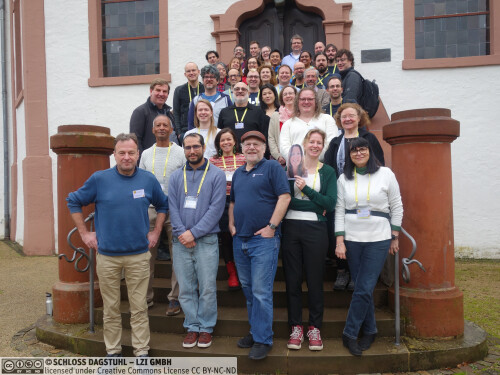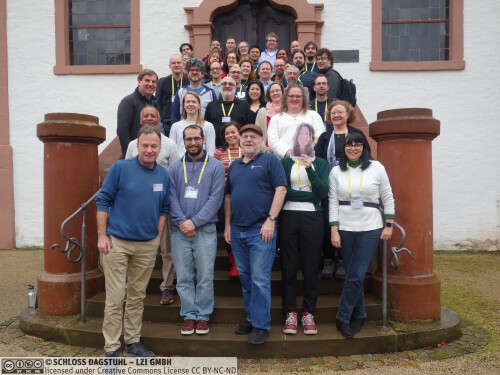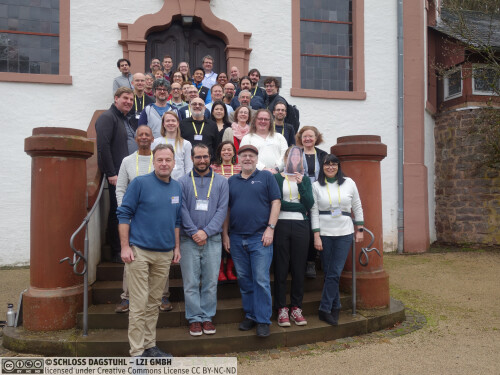Dagstuhl Seminar 25051
Trust and Accountability in Knowledge Graph-Based AI for Self Determination
( Jan 26 – Jan 31, 2025 )
Permalink
Organizers
- John Domingue (The Open University - Milton Keynes, GB)
- Luis-Daniel Ibáñez (University of Southampton, GB)
- Sabrina Kirrane (Wirtschaftsuniversität Wien, AT)
- Maria-Esther Vidal (TIB - Hannover, DE)
Contact
- Michael Gerke (for scientific matters)
- Susanne Bach-Bernhard (for administrative matters)
Dagstuhl Reports
As part of the mandatory documentation, participants are asked to submit their talk abstracts, working group results, etc. for publication in our series Dagstuhl Reports via the Dagstuhl Reports Submission System.
- Upload (Use personal credentials as created in DOOR to log in)
Shared Documents
- Dagstuhl Materials Page (Use personal credentials as created in DOOR to log in)
Schedule
- Upload (Use personal credentials as created in DOOR to log in)
In just one minute in April 2022, there were 5,900,000 searches on Google, 1,700,000 pieces of content shared on Facebook, 1,000,000 hours streamed and 347,200 tweets shared on Twitter.1 This content and data is linked to a plethora of Artificial Intelligence (AI) services which have increasingly been based on Knowledge Graphs (KGs), i.e., machine-readable data and schema representations based on a web stack of standards. The term ‘Knowledge Graph’ was first introduced by Google in 2012 and is strongly linked to the work of the Semantic Web community which first began in around 2001 based on the seminal paper by Berners-Lee et al. 2001.2 The main types of areas covered by AI services include, for example, content recommendation, user input prediction, and large-scale search and discovery and form the basis for the business models of companies such as Google, Netflix, Spotify, and Facebook.
Over a number of years, there have been growing concerns on how personal data can be abused and thus, how AI services impinge on citizen rights. For example, the over centralisation of data and linked abuses led Sir Tim Berners-Lee to call the Web ‘anti-human’ in an interview in 2018 3 and since 2016, hundreds of US Immigration and Customs Enforcement employees have faced investigations into abuse of confidential law enforcement databases including stalking and harassment to passing data to criminals. 4 The subject of proposed legislation today is ensuring that digital platforms, including AI platforms, provide societal benefit. Within Europe the proposed EU AI Act aims to support safe AI that respects fundamental human rights. The regulation sets what technologists need to do. This Dagstuhl Seminar, which aims to better understand the technical landscape, is structured around three pillar research topics - trust, accountability, and self-determination - that represent the desired goals, and four foundational research topics - Machine-readable Norms and Policies, Decentralised KG Management, Neuro-Symbolic AI, and Decentralised Applications - that constitute the necessary technical foundations to achieve the goals. Regulation sets what technologists need to do, leading to questions concerning: How can the output of AI systems be trusted? What is needed to ensure that the data fuelling and the inner workings of these artefacts are transparent? How can AI be made accountable for its decision-making? The seminar will explore these questions from an KG-based AI viewpoint. In particular, the seminar will comprise three pillars outlined above - trust, accountability, and self-determination - which will form the structure for the first part of the event. We envisage that the technical mechanisms mentioned earlier will also be covered as well: Machine-readable Norms and Policies, Decentralised KG Management, Neuro-Symbolic AI, and Decentralised Applications. In terms of the event format, the seminar will be guided by short introductory talks along the foundational research topics, use cases based on previous projects and experience, as well as knowledge sharing and ideation.
References
- https://www.statista.com/statistics/195140/new-user-generated-content-uploaded-by-users-per-minute.
- Berners-Lee, T., Hendler, J. and Lassila, O., 2001. The semantic web. Scientific American, 284(5), pp. 34-43.
- "I Was Devastated": Tim Berners-Lee, the Man Who Created the World Wide Web, Has Some Regrets | Vanity .
- https://www.wired.com/story/ice-agent-database-abuse-records/
 John Domingue, Luis-Daniel Ibáñez, Sabrina Kirrane, and Maria-Esther Vidal
John Domingue, Luis-Daniel Ibáñez, Sabrina Kirrane, and Maria-Esther Vidal
Please log in to DOOR to see more details.
- Sören Auer (TIB - Hannover, DE) [dblp]
- Piero Andrea Bonatti (University of Naples, IT) [dblp]
- Irene Celino (CEFRIEL - Milan, IT) [dblp]
- Andrea Cimmino (Polytechnic University of Madrid, ES)
- Michael Cochez (VU Amsterdam, NL) [dblp]
- John Domingue (The Open University - Milton Keynes, GB) [dblp]
- Michel Dumontier (Maastricht University, NL) [dblp]
- Fajar Ekaputra (Wirtschaftsuniversität Wien, AT)
- Nicoletta Fornara (University of Lugano, CH) [dblp]
- Sandra Geisler (RWTH Aachen, DE) [dblp]
- Anna Lisa Gentile (IBM Almaden Center - San Jose, US) [dblp]
- José Manuel Gómez-Pérez (Expert.ai - Madrid, ES)
- Marko Grobelnik (Jozef Stefan Institute - Ljubljana, SI) [dblp]
- Paul Groth (University of Amsterdam, NL) [dblp]
- Peter Haase (Metaphacts - Walldorf, DE) [dblp]
- Andreas Harth (Fraunhofer IIS - Nürnberg, DE) [dblp]
- Olaf Hartig (Linköping University, SE) [dblp]
- James A. Hendler (Rensselaer Polytechnic Institute - Troy, US) [dblp]
- Aidan Hogan (University of Chile - Santiago de Chile, CL) [dblp]
- Katja Hose (TU Wien, AT) [dblp]
- Luis-Daniel Ibáñez (University of Southampton, GB)
- Ryutaro Ichise (Institute of Science Tokyo, JP)
- Ernesto Jiménez-Ruiz (City - University of London, GB)
- Timotheus Kampik (SAP Berlin, DE & Umeå University, SE) [dblp]
- George Konstantinidis (University of Southampton, GB)
- Manolis Koubarakis (University of Athens, GR)
- Deborah L. McGuinness (Rensselaer Polytechnic Institute - Troy, US) [dblp]
- Julian Padget (University of Bath, GB) [dblp]
- Monica Palmirani (University of Bologna, IT) [dblp]
- Heiko Paulheim (Universität Mannheim, DE) [dblp]
- Philipp D. Rohde (TIB - Hannover, DE)
- Daniel Schwabe (Rio de Janeiro, BR) [dblp]
- Oshani Seneviratne (Rensselaer Polytechnic - Troy, US) [dblp]
- Chang Sun (Maastricht University, NL) [dblp]
- Aisling Third (The Open University - Milton Keynes, GB)
- Ruben Verborgh (Ghent University, BE) [dblp]
- Maria-Esther Vidal (TIB - Hannover, DE) [dblp]
- Jesse Wright (Open Data Institute - London, GB)
Classification
- Artificial Intelligence
- Computers and Society
- Databases
Keywords
- Trust
- Transparency
- Accountability
- Knowledge Graphs
- Web Data





 Creative Commons BY 4.0
Creative Commons BY 4.0
